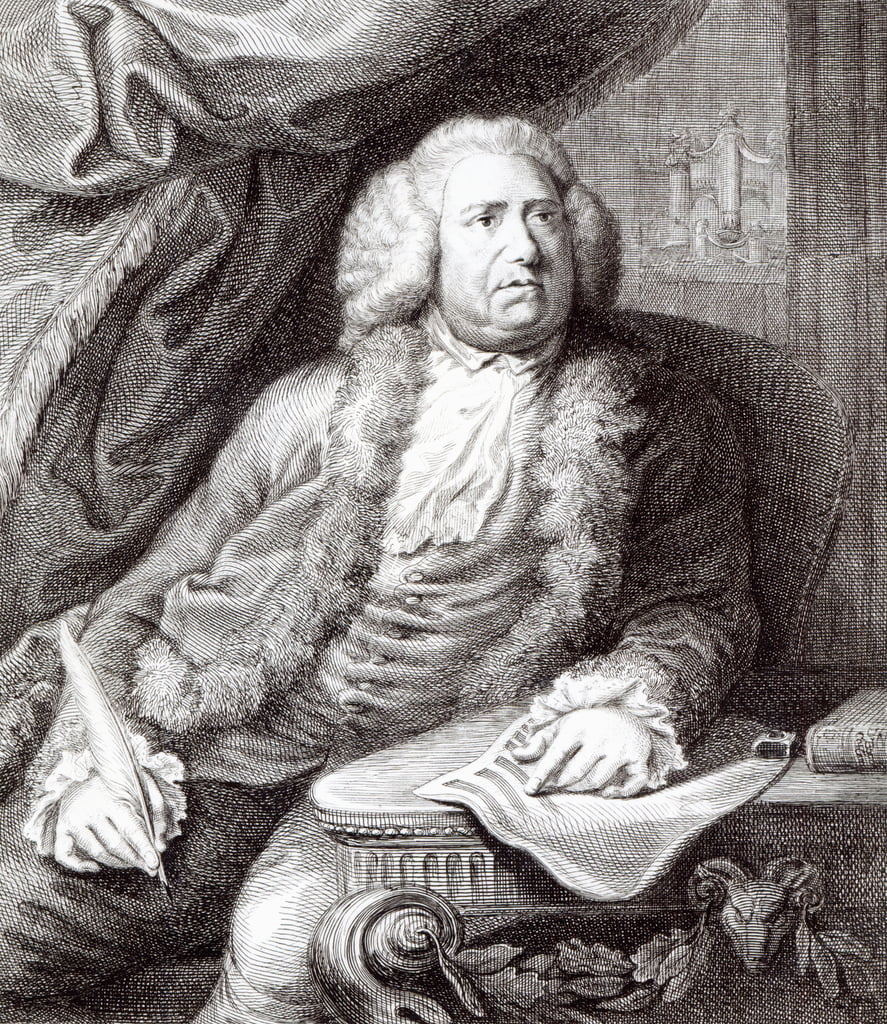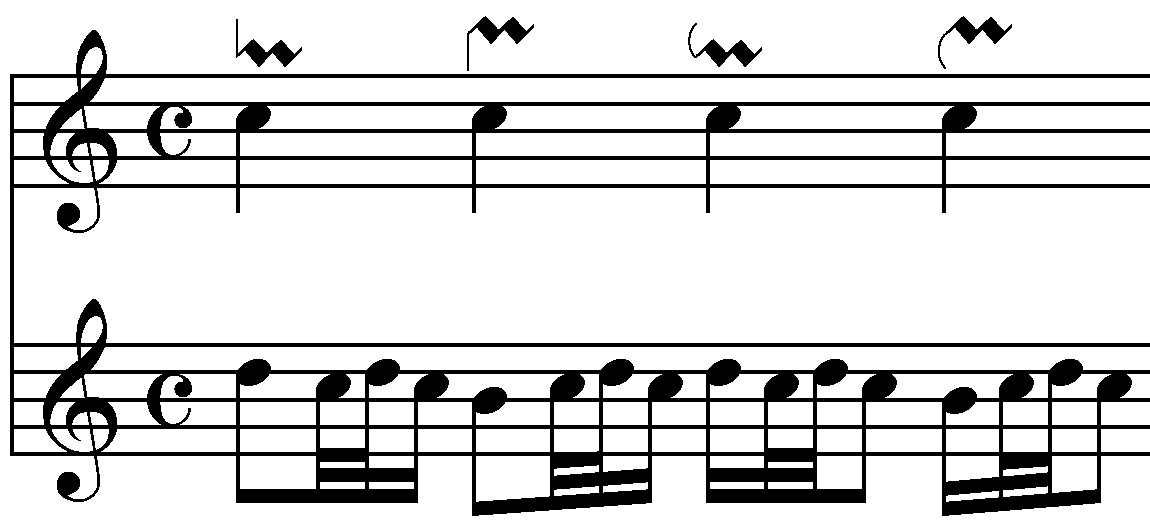|
John Bennett (composer)
John Bennett (or Bennet; c. 10 March 1735, Liverpool – September 1784, in London) was an English organist and composer. Biography Details of Bennett's life are limited, but it is known that he married one Sarah Everett in 1756 in Holborn and died in September 1784. He was buried on 24th of that month, after serving as organist at St. Dionis Backchuch, Fenchurch Street in London, for over thirty years. He had outlived his wife who was buried on 15 April 1778. Both were buried at the church. Charles Burney notes that he had been a pupil of Johann Christoph Pepusch and that he 'knew the rules of counterpoint very well'. Pearce, writing admittedly later in 1907, claims that Bennett was "an organist of sufficient talent to attract G. F. Handel to his performances". As was fairly typical in the eighteenth century, he was a diverse musician; he played the organ and the viola, taught the harpsichord, and performed at The Drury Lane Theatre as a singer in the chorus and as a dance ... [...More Info...] [...Related Items...] OR: [Wikipedia] [Google] [Baidu] |
Liverpool
Liverpool is a port City status in the United Kingdom, city and metropolitan borough in Merseyside, England. It is situated on the eastern side of the River Mersey, Mersey Estuary, near the Irish Sea, north-west of London. With a population of (in ), Liverpool is the administrative, cultural and economic centre of the Liverpool City Region, a combined authority, combined authority area with a population of over 1.5 million. Established as a borough in Lancashire in 1207, Liverpool became significant in the late 17th century when the Port of Liverpool was heavily involved in the Atlantic slave trade. The port also imported cotton for the Textile manufacture during the British Industrial Revolution, Lancashire textile mills, and became a major departure point for English and Irish emigrants to North America. Liverpool rose to global economic importance at the forefront of the Industrial Revolution in the 19th century and was home to the Liverpool and Manchester Railway, firs ... [...More Info...] [...Related Items...] OR: [Wikipedia] [Google] [Baidu] |
William Boyce (composer)
William Boyce (baptised 11 September 1711 – 7 February 1779) was an English composer and organist. Like Beethoven later on, he became deaf but continued to compose. He knew Handel, Thomas Arne, Arne, Christoph Willibald Gluck, Gluck, Johann Christian Bach, J.C. Bach, Carl Friedrich Abel, Abel, and a very young Mozart, all of whom respected his work. Life Boyce was born in London, at Joiners Hall, then in Lower Thames Street, to John Boyce, at the time a joiner and cabinet-maker, and beadle of the Worshipful Company of Joiners and Ceilers, and his wife Elizabeth Cordwell. He was baptised on 11 September 1711 and was admitted by his father as a choirboy at St Paul's Cathedral in 1719. After his voice broke in 1727, he studied music with Maurice Greene (composer), Maurice Greene.Bruce (2005) His first professional appointment came in 1734 when he was employed as an organist at the St Peter, Vere Street, Oxford Chapel in central London. He went on to take a number of similar post ... [...More Info...] [...Related Items...] OR: [Wikipedia] [Google] [Baidu] |
18th-century English Classical Composers
The 18th century lasted from 1 January 1701 (represented by the Roman numerals MDCCI) to 31 December 1800 (MDCCC). During the 18th century, elements of Age of Enlightenment, Enlightenment thinking culminated in the Atlantic Revolutions. Revolutions began to challenge the legitimacy of monarchical and aristocratic power structures. The Industrial Revolution began mid-century, leading to radical changes in Society, human society and the Natural environment, environment. The European colonization of the Americas and other parts of the world intensified and associated mass migrations of people grew in size as part of the Age of Sail. During the century, History of slavery, slave trading expanded across the shores of the Atlantic Ocean, while declining in Russian Empire, Russia and Qing dynasty, China. Western world, Western historians have occasionally defined the 18th century otherwise for the purposes of their work. For example, the "short" 18th century may be defined as 1715� ... [...More Info...] [...Related Items...] OR: [Wikipedia] [Google] [Baidu] |
Pupils Of Johann Christoph Pepusch
The pupil is a hole located in the center of the iris of the eye that allows light to strike the retina.Cassin, B. and Solomon, S. (1990) ''Dictionary of Eye Terminology''. Gainesville, Florida: Triad Publishing Company. It appears black because light rays entering the pupil are either absorbed by the tissues inside the eye directly, or absorbed after diffuse reflections within the eye that mostly miss exiting the narrow pupil. The size of the pupil is controlled by the iris, and varies depending on many factors, the most significant being the amount of light in the environment. The term "pupil" was coined by Gerard of Cremona. In humans, the pupil is circular, but its shape varies between species; some cats, reptiles, and foxes have vertical slit pupils, goats and sheep have horizontally oriented pupils, and some catfish have annular types. In optical terms, the anatomical pupil is the eye's aperture and the iris is the aperture stop. The image of the pupil as seen from outsid ... [...More Info...] [...Related Items...] OR: [Wikipedia] [Google] [Baidu] |
English Classical Organists
English usually refers to: * English language * English people English may also refer to: Culture, language and peoples * ''English'', an adjective for something of, from, or related to England * ''English'', an Amish term for non-Amish, regardless of ethnicity * English studies, the study of English language and literature Media * ''English'' (2013 film), a Malayalam-language film * ''English'' (novel), a Chinese book by Wang Gang ** ''English'' (2018 film), a Chinese adaptation * ''The English'' (TV series), a 2022 Western-genre miniseries * ''English'' (play), a 2022 play by Sanaz Toossi People and fictional characters * English (surname), a list of people and fictional characters * English Fisher (1928–2011), American boxing coach * English Gardner (born 1992), American track and field sprinter * English McConnell (1882–1928), Irish footballer * Aiden English, a ring name of Matthew Rehwoldt (born 1987), American former professional wrestle ... [...More Info...] [...Related Items...] OR: [Wikipedia] [Google] [Baidu] |
Composers For Pipe Organ
A composer is a person who writes music. The term is especially used to indicate composers of Western classical music, or those who are composers by occupation. Many composers are, or were, also skilled performers of music. Etymology and definition The term is descended from Latin, ''compōnō''; literally "one who puts together". The earliest use of the term in a musical context given by the ''Oxford English Dictionary'' is from Thomas Morley's 1597 ''A Plain and Easy Introduction to Practical Music'', where he says "Some wil be good descanters ..and yet wil be but bad composers". "Composer" is a loose term that generally refers to any person who writes music. More specifically, it is often used to denote people who are composers by occupation, or those who work in the tradition of Western classical music. Writers of exclusively or primarily songs may be called composers, but since the 20th century the terms 'songwriter' or 'singer-songwriter' are more often used, partic ... [...More Info...] [...Related Items...] OR: [Wikipedia] [Google] [Baidu] |
English Classical-period Composers
English usually refers to: * English language * English people English may also refer to: Culture, language and peoples * ''English'', an adjective for something of, from, or related to England * ''English'', an Amish term for non-Amish, regardless of ethnicity * English studies, the study of English language and literature Media * ''English'' (2013 film), a Malayalam-language film * ''English'' (novel), a Chinese book by Wang Gang ** ''English'' (2018 film), a Chinese adaptation * ''The English'' (TV series), a 2022 Western-genre miniseries * ''English'' (play), a 2022 play by Sanaz Toossi People and fictional characters * English (surname), a list of people and fictional characters * English Fisher (1928–2011), American boxing coach * English Gardner (born 1992), American track and field sprinter * English McConnell (1882–1928), Irish footballer * Aiden English, a ring name of Matthew Rehwoldt (born 1987), American former professional wrestler ... [...More Info...] [...Related Items...] OR: [Wikipedia] [Google] [Baidu] |
1784 Deaths
Events January–March * January 6 – Treaty of Constantinople: The Ottoman Empire agrees to Russian Empire, Russia's annexation of the Crimean Peninsula, Crimea. * January 14 – The Congress of the United States ratifies the Treaty of Paris (1783), Treaty of Paris with Kingdom of Great Britain, Great Britain to end the American Revolution, with the signature of President of the Continental Congress, President of Congress Thomas Mifflin.''Harper's Encyclopaedia of United States History from 458 A. D. to 1909'', ed. by Benson John Lossing and, Woodrow Wilson (Harper & Brothers, 1910) p167 * January 15 – Henry Cavendish's paper to the Royal Society of London, ''Experiments on Air'', reveals the composition of water (molecule), water. * February 24 – The Captivity of Mangalorean Catholics at Seringapatam begins. * February 28 – John Wesley ordains ministers for the Methodist Church in the United States. * March 1 – The Confederation Congr ... [...More Info...] [...Related Items...] OR: [Wikipedia] [Google] [Baidu] |
1735 Births
Events January–March * January 2 – Alexander Pope's poem ''Epistle to Dr Arbuthnot'' is published in London. * January 8 – George Frideric Handel's opera ''Ariodante'' is premièred at the Royal Opera House in Covent Garden, London. * February 3 – All 256 people on board the Dutch East India Company ships '''t Vliegend Hert, Vliegenthart'' and ''Anna Catherina'' die when the two ships sink in a gale off of the Netherlands coast. The wreckage of ''Vliegenthart'' remains undiscovered until 1981. * February 14 – The Order of St. Anna is established in Russia, in honor of the daughter of Peter the Great. * March 10 – The Russian Empire and Persia sign the Treaty of Ganja, with Russia ceding territories in the Caucasus mountains to Persia, and the two rivals forming a defensive alliance against the Ottoman Empire. * March 11 – Abraham Patras becomes the Governor-General of the Dutch East Indies (modern-day Indonesia) upon the death of D ... [...More Info...] [...Related Items...] OR: [Wikipedia] [Google] [Baidu] |
Acciaccatura
In music, ornaments or embellishments are musical flourishes—typically, added notes—that are not essential to carry the overall line of the melody (or harmony), but serve instead to decorate or "ornament" that line (or harmony), provide added interest and variety, and give the performer the opportunity to add expressiveness to a song or piece. Many ornaments are performed as "fast notes" around a central, main note. There are many types of ornaments, ranging from the addition of a single, short grace note before a main note to the performance of a virtuosic and flamboyant trill. The amount of ornamentation in a piece of music can vary from quite extensive (it was often extensive in the Baroque period, from 1600 to 1750) to relatively little or even none. The word ''agrément'' is used specifically to indicate the French Baroque style of ornamentation. Improvised vs. written In the Baroque period, it was common for performers to improvise ornamentation on a given mel ... [...More Info...] [...Related Items...] OR: [Wikipedia] [Google] [Baidu] |
Appoggiatura
An appoggiatura ( , ; or ; ) is a musical ornament that consists of an added non-chord note in a melody that is resolved to the regular note of the chord. By putting the non-chord tone on a strong beat, (typically the first or third beats of the measure, in 4/4 time) this accents the appoggiatura note, which also delays the appearance of the principal, expected chord note. The added non-chord note, or auxiliary note, is typically one degree higher or lower than the principal note, and may be chromatically altered. An appoggiatura may be added to a melody in a vocal song or in an instrumental work. The term comes from the Italian verb , "to lean upon". The appoggiatura is often used to express emotional "yearning". It is also called a long appoggiatura to distinguish it from the short appoggiatura, the acciaccatura. An ascending appoggiatura was previously known as a forefall, while a descending appoggiatura was known as a backfall. Notation The appoggiatura is often writ ... [...More Info...] [...Related Items...] OR: [Wikipedia] [Google] [Baidu] |
Mordent
In music, a mordent is an ornament indicating that the note is to be played with ''a single'' rapid alternation with the note above or below. Like trills, they can be chromatically modified by a small flat, sharp or natural accidental. The term entered English musical terminology at the beginning of the 19th century, from the German and its Italian etymon, , both used in the 18th century to describe this musical figure. The word ultimately is derived . The ''mordent'' is thought of as a rapid single alternation between an indicated note, the note above (the ''upper mordent'') or below (the ''lower mordent'') and the indicated note again. In musical notation, the upper mordent is indicated by a short squiggle; the lower mordent is the same with a short vertical line through it: : As with the trill, the exact speed with which the mordent is performed will vary according to the tempo of the piece, but at a moderate tempo the above might be executed as follows: : T ... [...More Info...] [...Related Items...] OR: [Wikipedia] [Google] [Baidu] |








